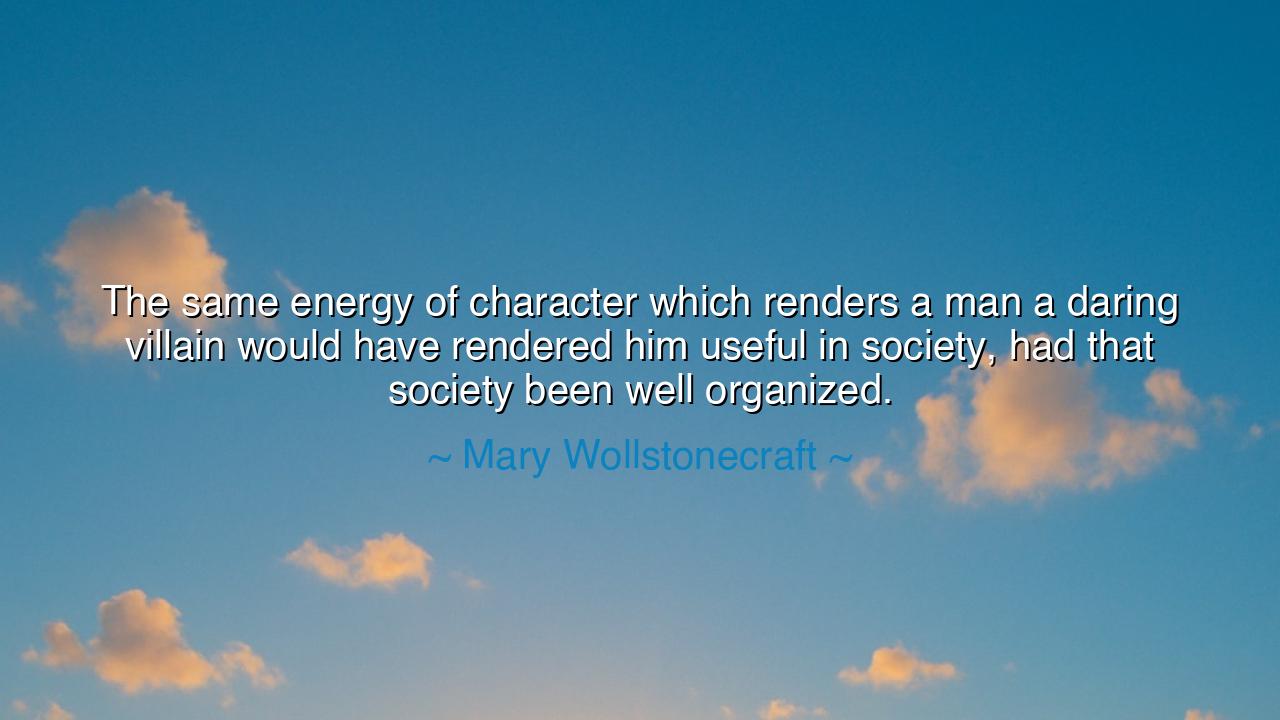
The same energy of character which renders a man a daring villain
The same energy of character which renders a man a daring villain would have rendered him useful in society, had that society been well organized.






Hear the voice of Mary Wollstonecraft, prophetess of reason and justice, who declared: “The same energy of character which renders a man a daring villain would have rendered him useful in society, had that society been well organized.” These words pierce to the root of human destiny, for they remind us that evil is not always born from weakness, but often from misdirected strength. The fire that burns cities could have warmed homes; the courage that oppresses could have liberated; the genius that plots destruction could have woven creation. Whether a man becomes a villain or a benefactor depends not only on his spirit but on the guidance and justice of the world in which he lives.
The energy of character is no small thing. It is the force that drives a man to defy fear, to press forward where others retreat, to grasp power and bend it to his will. In some, this becomes cruelty, ambition without restraint, the audacity to crush others for personal gain. Yet Wollstonecraft teaches us that the flaw lies not in the energy itself, but in the society that fails to guide it toward noble ends. If men of daring find no righteous path, they will carve a wicked one. If the gates of virtue are closed, they will storm the gates of vice. Thus, the misdeeds of the bold reflect not only their own corruption but also the organization of the community that birthed them.
History is filled with such men. Consider Napoleon Bonaparte: a youth of boundless ambition, discipline, and brilliance. In a time of revolution and chaos, he rose from obscurity to command nations. Had society been better organized, his gifts might have rebuilt France upon principles of liberty and equality. Instead, his energy of character became that of a conqueror, leaving trails of blood across Europe. Yet even in his tyranny, one sees the truth of Wollstonecraft’s words: that the same fire which forged an emperor of war could, in another order of things, have forged a statesman of peace.
But we need not look only to emperors. Think of the gangs that rise in the slums of great cities. The youth who leads them is often no dullard, no coward, but bold, cunning, fearless, and loyal to his companions. In a just and well-ordered society, such a one might have been a leader of men, an inventor, a protector of his community. But neglected by his world, denied opportunity, and taught to scorn the law, his talents become instruments of ruin. Here the words of Wollstonecraft echo like judgment: it is not only the man who has failed, but the society that abandoned him.
The lesson is stern and luminous: we must never mistake raw energy, courage, or ambition as evil in themselves. They are like rivers—if channeled, they irrigate fields and bring life; if left wild, they flood and destroy. Thus, the duty of a well-organized society is to shape the daring spirit, to give it honorable work, to direct its force toward the common good. Education, justice, and opportunity are the tools by which the villain may be transformed into the guardian, the innovator, the hero.
What, then, must we do? In our homes, nurture the boldness of children, not by crushing their wildness but by teaching them how to wield it rightly. In our communities, create paths where the strong may labor for justice and the ambitious may find noble outlets. In our nations, build institutions that recognize talent wherever it is found, and offer it a place to flourish. For every wasted genius, every corrupted spirit, is not only a personal tragedy but a wound upon the whole people.
Thus remember: the energy of character is a sacred flame. Left unguided, it consumes. Guided with wisdom, it enlightens. Do not fear the strong-willed, the daring, the relentless—fear instead a society too blind to direct them toward the good. For in the end, the difference between the villain and the benefactor is not the fire within, but the hands of the world that either quenched it or gave it purpose. Let us be those hands, shaping strength into service, and transforming danger into destiny.






AAdministratorAdministrator
Welcome, honored guests. Please leave a comment, we will respond soon